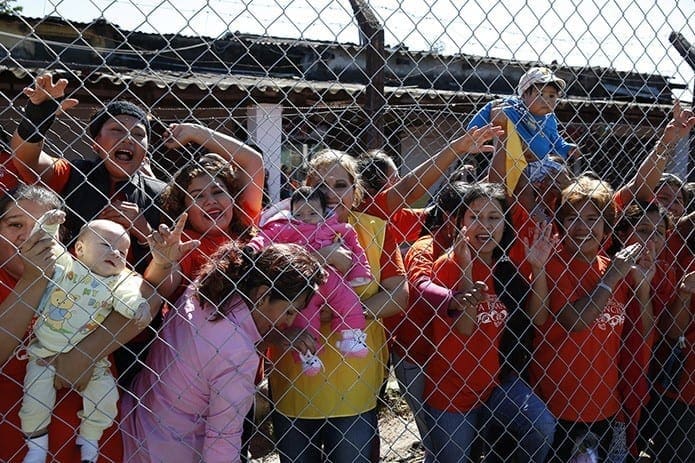 CNS photo/Paul Haring
CNS photo/Paul HaringBolivia
At Bolivian prison, pope calls himself man ‘saved from his many sins’
By DAVID AGREN, Catholic News Service | Published July 23, 2015
SANTA CRUZ, Bolivia (CNS)—Pope Francis visited one of Latin America’s most notorious prisons, calling himself “a man who was and is saved from his many sins.”
“I couldn’t leave Bolivia without seeing you, without sharing the hope and faith given in the cross,” he told people at Palmasola prison in Santa Cruz.
Speaking on the final morning of his less than 48-hour visit to Bolivia, the pope called for conversion and a changing of attitudes among inmates in their relations among each other and the broader society, which often views such populations with suspicions.
“When Jesus becomes part of our lives, we can no longer remain imprisoned by our past,” Pope Francis said. “Instead, we begin to look to the present, and we see it differently, with a different kind of hope.”
The visit again reflected the pope’s preoccupation for prison populations, who, in Latin America, often serve their sentences in overcrowded and violent facilities—if they’re sentenced at all.
Palmasola has an especially notorious reputation, especially after a 2013 incident in which a gang armed with improvised flamethrowers killed 31 inmates and left more than 30 others badly burned.
Three inmates told Pope Francis of their tribulations inside the prison.
Families of prisoners must bring them food
Papal well-wishers lined a muddy road to the prison, where families of the inmates say they have to pay for everything on the inside—including food and places to sleep. The prison is open for the most part, families say, with an economy of shops, services and food spots set up; the wives and children of some inmates live on the inside.
The prison ministry reports 84 percent of inmates have not been convicted of any crimes. Overcrowding in prisons tops 300 percent. Access to justice is limited, and inmates are forced to pay the transportation costs or give gas money to attend their court days.
“(It’s) judicial terrorism,” while those with money pay for lawyers and exit quickly, said Analia Parada, who spoke for the female prison population, which included “many pregnant women.”
Prison officials spend the equivalent of 87 cents per prisoner per day on food, forcing families to feed and maintain their loved ones on the inside.
Officials of the Bolivian bishops’ prison ministry were blunt in their assessment of the problems in Bolivia’s prisons.
“Holy Father, we have to tell you with the prophetic voice of a committed church: It’s a scandal for Bolivia,” said Archbishop Jesus Juarez Parraga of Sucre, president of Caritas Bolivia and national director of its prison ministry.
“We see in (the inmates) the contradictory signal of being victims and victimizers, the evidence of a society that produces poverty, inequality and violence; the weakness of morals in the family, education and even in religions,” he said.
The papal visit, Archbishop Juarez added, “makes real and present the words of Jesus: ‘I was in prison and you came to visit me.’”
‘Help one another’
Pope Francis called for solidarity with prison populations, but also for inmates to show solidarity among themselves.
“Being imprisoned, ‘shut in,’ is not the same thing as being ‘shut out.’ Detention is part of a process of reintegration into society,” Pope Francis said. “The way you live together depends to some extent on yourselves. Suffering and deprivation can make us selfish of heart and lead to confrontation.”
“Do not be afraid to help one another. The devil is looking for rivalry, division, gangs.”
The pope ended his speech by asking the inmates to pray for him, “because I, too, have my mistakes, and I too must do penance.”